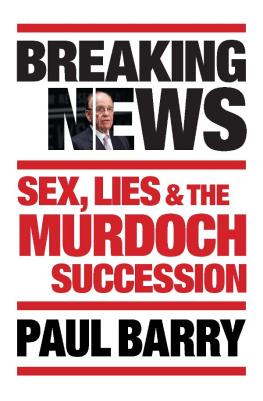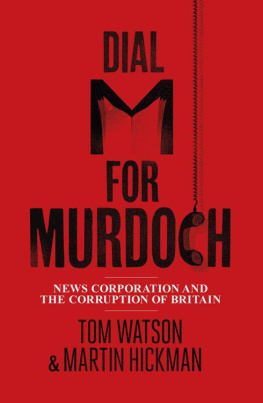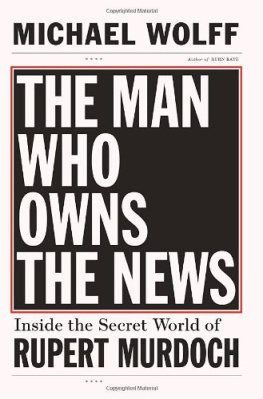Rupert Murdoch
RODNEY TIFFEN is emeritus professor in Government and International Relations at the University of Sydney. A leading international scholar of media, his books include News and Power (1989); Scandals: Media, Politics and Corruption in Contemporary Australia (1999); Diplomatic Deceits: Government, Media and East Timor (2001), and numerous other publications on mass media and Australian politics. His most recent book, with Ross Gittins, is How Australia Compares (2nd ed. 2009). He worked with the Media Monitoring Project as an observer during the 1994 South African election, conducted three reviews of Radio Australia, and worked with the independent Finkelstein Inquiry into the media in 201112.
Rupert Murdoch
A Reassessment
RODNEY TIFFEN

A NewSouth book
Published by
NewSouth Publishing
University of New South Wales Press Ltd
University of New South Wales
Sydney NSW 2052
AUSTRALIA
newsouthpublishing.com
Rodney Tiffen 2014
First published 2014
This book is copyrightright. Apart from any fair dealing for the purpose of private study, research, criticism or review, as permitted under the Copyright Act, no part of this book may be reproduced by any process without written permission. Inquiries should be addressed to the publisher.
National Library of Australia
Cataloguing-in-Publication entry
Author: Tiffen, Rodney, author.
Title: Rupert Murdoch: a reassessment / Rodney Tiffen.
ISBN: 9781742233567 (paperback)
9781742241494 (ePub/Kindle)
9781742246420 (ePDF)
Notes: Includes bibliographical references and index.
Subjects: Murdoch, Rupert, 1931 Influence.
Directors of corporations.
Newspaper publishing.
Mass media Influence.
Corporate power.
Scandals.
Dewey Number: 070.92
Design Josephine Pajor-Markus
Cover design Xou Creative
Cover image Peter Macdiarmid/Getty Images

All reasonable efforts were taken to obtain permission to use copyrightright material reproduced in this book, but in some cases copyrightright could not be traced. The author welcomes information in this regard.
Contents
Acknowledgements
Douglas Adams begins one of his comic science fiction novels with the observation that in no known language is there the phrase as pretty as an airport. It is also likely that in no known language is there the phrase as exciting as living with a writer. My deepest thanks in the writing of this book are, as always, to my wife Kathryn, who not only read the whole draft, but lived uncomplainingly, indeed cheerfully and supportively, through its long gestation.
My next greatest thanks are to my friends Peter Browne and Ross Gittins, who also read the whole manuscript and gave me careful and constructive feedback, which improved the book greatly. Mark McDonnell, a leading financial analyst, will not agree with all the judgements in the book, but generously read and gave helpful advice on the business chapters. David McKnight, Chris Masters and Nick Davies were kind enough to give me feedback on individual chapters.
I am grateful to Murdoch watchers in Sydney, Melbourne and London who helped with insights and information, including Eric Beecher, Brian Cathcart, Neil Chenoweth, Nick Davies, Bruce Dover, Roy Greenslade, Bruce Guthrie, Charlotte Harris, David Hayes, Martin Hickman, Brian MacArthur, David McKnight, Stephen Mayne and Dimity Torbett. I made a research visit to New York, but my period there coincided exactly with Hurricane Sandy, and all the meetings I had arranged fell through. I do not blame Rupert Murdoch for this, however.
Again I am grateful for the collegiality of the departments of Media and Communications and Government and International Relations at the University of Sydney, especially Graeme Gill, and of media scholars more generally, especially David Rowe, Paul Jones, James Curran, Howard Tumber and Jeremy Tunstall.
I would also like to thank Sarah Shrubb, Emma Driver, Geraldine Suter and especially Phillipa McGuinness at NewSouth Publishing. All these people helped improve the book, but any remaining errors are, of course, mine, except that all complaints about punctuation should be directed to Ross Gittins.
Finally, I would like to thank my parents, Gladys and Leslie Tiffen, for an inheritance beyond riches, and our children, Paul and Ruth, who are unlikely to inherit a family company.
Murdoch family tree
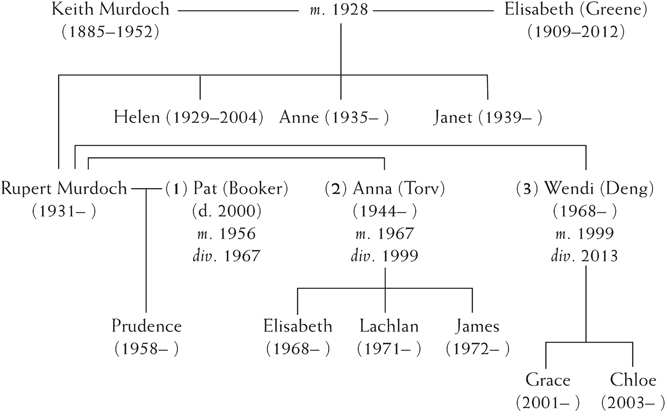
Murdoch company names
Rupert Murdochs first company in Australia was called News Limited.
His British operations from 1968 on went under the name News International.
His American and his global company went under the name News Corp.
In 2013, News Corp split its operations in two, with one part operating as Twenty-First Century Fox and the other retaining the name News Corp, often referred to as the new News Corp. The Australian operations are now called News Corp Australia.
The passing of the Murdoch era?
16 October 2013 marked Rupert Murdochs 60th anniversary as a director of News Limited. Since 1953, although his formal titles have changed at various times, he has been in charge. Such business longevity may be unique. It is hard to think of any other corporate head who has had such a long tenure.
Murdochs record is extraordinary at both ends of the age spectrum. He is still running a company in his eighties, a time when most chief executives have long since retired. Likewise, he gained control at the tender age of 22 as a result of the death of his father Sir Keith Murdoch, who had been the dominant figure in Australian journalism for three decades. Although Sir Keith had been head of Australias largest newspaper group, the Herald and Weekly Times, his actual ownership of newspapers was much more limited. Ruperts inheritance was restricted to one afternoon newspaper in the South Australian capital, Adelaide.
When Rupert arrived at the Adelaide News, television had not yet begun in Australia, geostationary communication satellites did not exist, and of course no one could even envisage the internet. The movement from a single newspaper in Australias fourth (now fifth) largest city to a multi-media empire with global reach is by any measure a remarkable business success story.
According to the Financial Times Global 500, in June 2012 News Corp ranked 120th among the worlds corporations by market value, with a total of $54.2 billion, one ahead of the National Australia Bank.Disney (ranked 57, value $86.7 billion), and a long way ahead of the third-ranked Time Warner (183), although some other corporations, particularly those classified as IT and telecommunications, have expanded into media areas.
News Corp differed from the other leading global media corporations in two crucial respects. The first was that its roots and still much of its public profile lay in newspapers, and so in a medium where politics and the potential for political bias and conflict were ever-present.
The second was that, far more than any of the others, News Corp was the personification of its principal owner, its actions inevitably associated both in the public mind and in reality with Murdoch himself. For better or worse, [News Corp] is a reflection of my thinking, my character, my values, said Murdoch in 1996. He stands in direct descent from the most controversial press barons in Anglo-American democracies, such as Britains Beaverbrook and Northcliffe and Americas Hearst and Pulitzer, relishing political power as much as commercial success, ruling internally with an iron fist and externally exciting controversy and gossip.
Next page
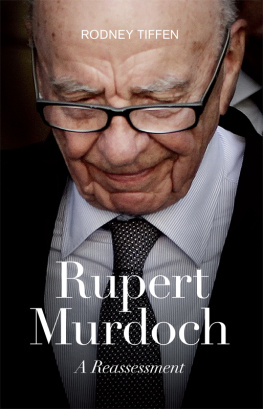

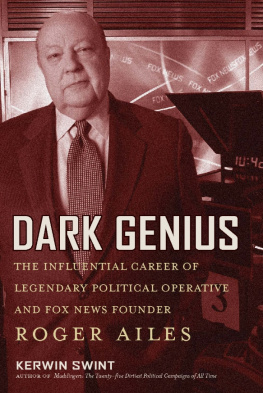
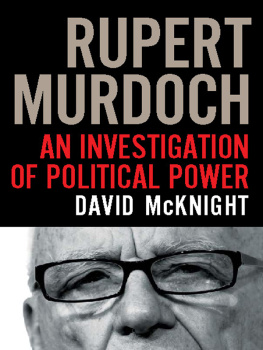
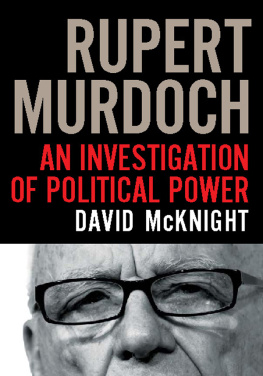
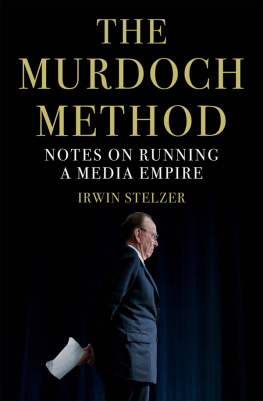
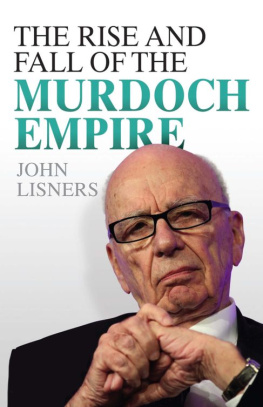
![Greenwald Robert - Outfoxed : [Rupert Murdochs war on journalism]](/uploads/posts/book/99754/thumbs/greenwald-robert-outfoxed-rupert-murdoch-s-war.jpg)
